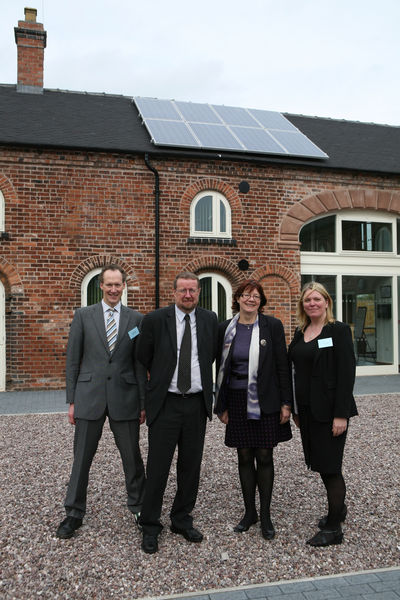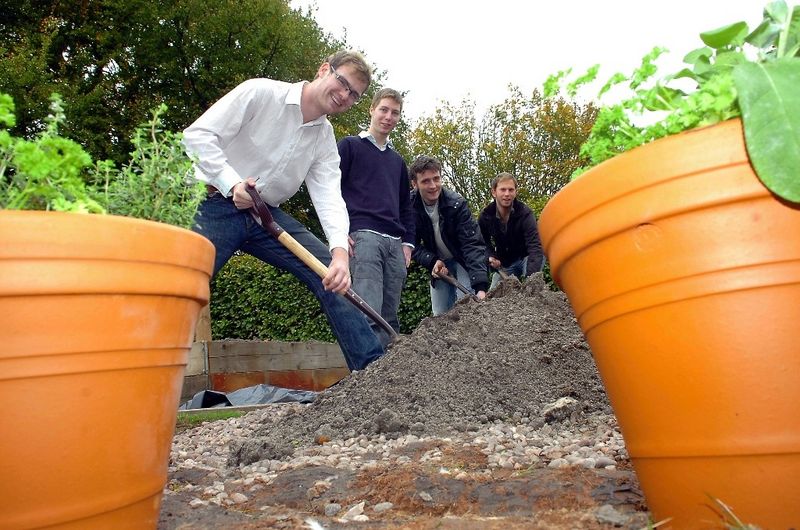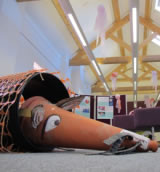Keele University
Keele University’s commitment ‘to develop an environmentally aware and sustainable outward-facing campus community’ lies at the heart of its Strategic Plan. It aims to be one of the top 10 ‘sustainable’ university campuses, by demonstrating sustainability across all activities on the campus and through outreach to schools and communities.
The Keele University Sustainability Hub
The recent opening, in October 2011, of the new Sustainability Hub in formerly derelict farm buildings at the main entrance to the university campus is one way in which the university can truly be ‘outward-facing’ in its approach. The aim of the Hub is to address the question ‘how do we engage the whole community in being more sustainable?’. Funding of £3.4M from HEFCE’s Strategic Development Fund has helped make this project a reality, and it is now a state of the art facility boasting an exhibition space, a lecture theatre, resource room and research base.
The Hub is a living example of sustainability in action, with solar PV, solar thermal, ground source heat pumps, biomass heating and rainwater recycling. The building has been designed to be an inspiring place for people of all ages to learn, with resources and outreach activities to help children, homeowners and businesses. Numerous workshops and events have been held since its opening to engage with all sectors of the community, from school children during ‘Really Rubbish Week’ to a ‘Green Christmas Fayre’ and ‘Dig it’ events for members of the public, and engagement with businesses through student project work. The Hub is involved in an outreach initiative called ‘Grey Matters’ which engages the older community in a series of lectures and interactive workshops on sustainable living, and has also assisted the development of a ‘green’ children’s centre in the Congo.
Sustainability in the Curriculum & Student Engagement
The university runs courses at both undergraduate and postgraduate level in the field of environmental sustainability and these courses are growing in popularity, with around 200 undergraduates and a similar number of postgraduate students in this area. Sustainability is one of three key themes running through the new Distinctive Keele Curriculum ensuring that sustainability will be embedded in all programmes by September 2012. Keele also offers co-curricular sustainability opportunities for all students and is committed to developing a culture of sustainability within the university.
This culture has been embraced by four students on the BSc programme who initiated a project to live in a Sustainable Student House on the campus during the 2011-12 academic year. Their aim is to act as exemplars of sustainable student living, by ‘living what they are learning’ and demonstrating ways of living more sustainable and affordable lifestyles whilst at university. The students’ activities involve growing food in the garden and trying out innovative ways to reduce waste and improve resource efficiency.
Research
Academic staff at Keele have active research interests in environmental sustainability across a variety of fields, from green technologies to the social and political aspects of sustainability. One notable project engages academics from Natural Sciences and Social Sciences departments on a two-year research exercise to examine the impact of social demographics on the level of community engagement in ‘green’ behaviours such as recycling or using low energy light bulbs. The project is about looking at the best models for sharing information on sustainable behaviours – the findings of which will form a central role in shaping future policy in this area.
The Estate
In October 2011, Keele was named as one of just 22 businesses across the UK to top the first government Carbon Reduction Commitment (CRC) Leagues Tables. Keele University was the only higher education institution to get top marks in the table, which ranks participants in terms of their early action to manage their energy. In the past year alone, Keele has saved over 1.5 thousand tonnes of CO2, increased to over a third of all waste recycled and introduced a sustainable catering policy, which aims to increase the sales of Fairtrade goods, reduce food waste per student, increase the purchase of seasonal vegetables and reduce water and energy usage.
In addition, all new build and refurbishment projects have been designed to achieve BREEAM ‘very good’ status, including a new day nursery, which will feature a green living sedum roof on two sides, plus one roof fitted with photovoltaic cells. In addition, recent go-ahead has been given by the University Executive Committee to build a series of allotments on campus managed and maintained by a mixed group including students, staff, campus residents and older members of the community.
This academic year has been an extremely exciting one for Sustainability at Keele University with a number of new initiatives and facilities on the campus to support and promote our environmental agenda. Our approach is an holistic one – bringing together all the activities into an integrated strategy. The recent installation of the university’s new Chancellor Jonathon Porritt reinforces further Keele University’s commitment to the sustainability agenda.
Main Contact Name: Mr Huw Evans, Environmental Manager
Main Contact Email & Telephone: [email protected] and 01782 734541
Further information/website: www.keele.ac.uk/livegreenkeele
www.keele.ac.uk/keelehub
Share with us: www.twitter.com/KeeleUniHub
www.facebook.com/KeeleUniversitySustainabilityHub
Blog: www.keeleuniversitysustainabilityhub.blogspot.co.uk















